In the realm of the best treadmills, NordicTrack and Sole are two of the top brands for home gym use. Each respective lineup has silhouettes primed for high-intensity training, walking, running, compact spaces, and more. However, the NordicTrack Commercial 1750 and F80 from Sole Fitness treadmills serve as flagships for a reason — they’re two premium cardio machines designed with comfort and performance in mind.
So, how would these two high-quality treads fare against one another side by side? In this NordicTrack Commercial 1750 vs. Sole F80 treadmill comparison, we’ll look at every aspect possible — from product dimensions to available running surface, programming options, storage features, and more — to help you get a grasp on which treadmill suits your space best. For more information on how we test equipment (like the over 100 treadmills we’ve had experience with), be sure to check out our BarBend equipment testing methodology page.
What is the NordicTrack Commercial 1750?
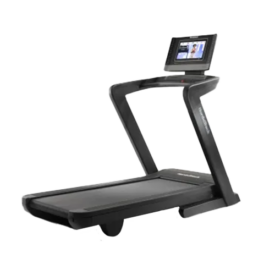
The NordicTrack Commercial 1750 is made for the tech-loving runner. This high-tech treadmill features a touchscreen monitor that can tilt and rotate, and offers automatic incline, decline, and speed adjustments based on the workout you choose.
As one of the best treadmills for running, the NordicTrack Commercial 1750 boasts a powerful 4.25 continuous horsepower motor capable of reaching speeds up to 12 miles per hour. What separates this from other treadmills in the category is its decline capabilities, too — the Commercial 1750 has an incline range between -3 and 15%, allowing you to better mimic on-road conditions from hilltop climbs to rolling descents.
Like the other best NordicTrack treadmills we’ve had the pleasure of testing, the Commercial 1750 is compatible with the iFIT training platform which gives you access to over 17,000 on-demand workout programs for disciplines including HIIT, yoga, and (of course) running. “One of my favorite features from this iFIT integration is the SmartAdjust technology,” notes our tester, a certified personal trainer. “Instead of toggling your speed and incline manually, your machine will automatically adjust your settings in tune with your on-screen instructor or route.”
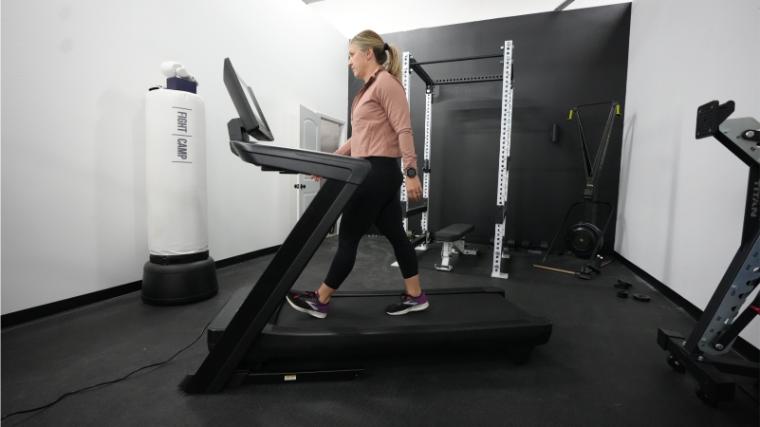
In addition to the tech features, the Commercial 1750 boasts a foldable running deck, making it a convenient option for those looking to make the most of their at-home training space. We also appreciate this SpaceSaver design, as the 19.86-square-foot operating footprint is already greater than that of your standard two-seat sofa (16.63 square feet). (1)
Read our full NordicTrack Commercial 1750 Treadmill Review.
What is the Sole F80?
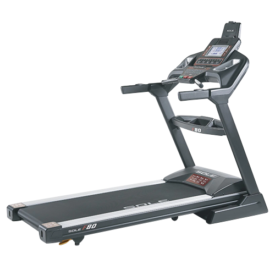
The SOLE F80 treadmill is full of modern touches. It can withstand long runs, offers an incline range up to 15% and speed range up to 12 mph, and has a cushioned deck that makes running 40% less impactful on your joints than the outdoors.
With a burly 21.77-square-foot footprint, the Sole F80 is by no means a compact treadmill. However, all the space is used well thanks to a powerful motor churning out 3.5 horsepower capable of speeds up to 12 miles per hour and inclines up to 15%. Additionally, the Cushion Flex Whisper Deck technology makes this one of the best cushioned treadmills on the market.
“It’s not overly plush, but I didn’t feel any jarring shock across my joints during training (which is a good thing),” notes our tester, a certified personal trainer. We also appreciate the spacious 22-inch by 60-inch running surface that allows for more intense running strides.
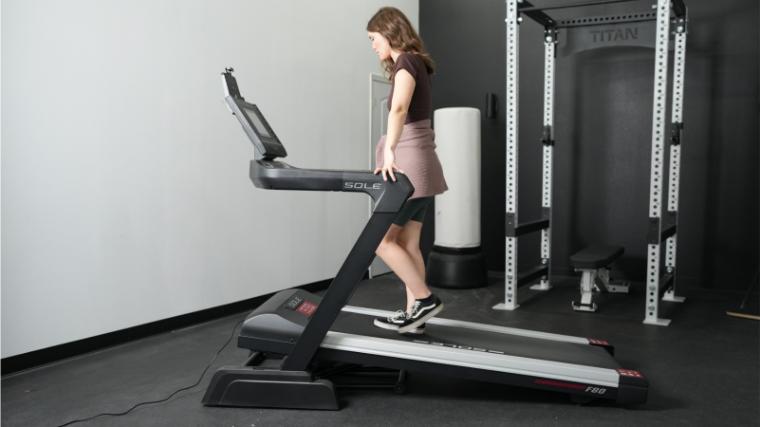
The Sole F80 is equipped with a 10.1-inch touchscreen display that comes pre-loaded with entertainment streaming apps like Netflix and ESPN. There are also 10 preset workout programs to choose from, or you can pair your cardio machine to the free (yes, free) Sole app loaded with hundreds of video training classes ideal for beginners and advanced runners, alike.
While the large footprint may be off-putting for some needs, the Sole F80 does feature a folding deck for more convenient storage along with front transport wheels for improved maneuverability. Otherwise, the 274-pound product weight could turn your next cardio sessions into a strength training workout.
Read our full Sole F80 Treadmill Review.
NordicTrack Commercial 1750 Vs. Sole F80: At a Glance
When looking for a treadmill for home use, it can be helpful to look at key specs side-to-side on such things as price point, weight capacity, product dimensions, and more. To save you the time of flipping between tabs (or creating a personal spreadsheet outlining treadmill motor sizes and available features), we’ve curated this in-depth chart outlining the major specs of both the Sole F80 and NordicTrack Commercial 1750.
| NordicTrack Commercial 1750 | Sole F80 | |
| Price | $2,499 | $1,899.99 |
| Product Dimensions | 77.3” L x 37” W x 59.5” H | 82.5″ L x 38″ W x 66″ H |
| Product Weight | 311.5lbs | 274lbs |
| Weight Capacity | 400lbs | 350lbs |
| Speed Range | 0-12mph | 0.5-12mph |
| Incline Range | -3-12% | 0-15% |
| Motor Size | 4.25 CHP | 3.5 HP |
| Display Size | 16” | 10.1” |
NordicTrack Commercial 1750 Vs. Sole F80: The Nitty Gritty
OK, so it can be one thing to compare the listed specs of popular home treadmills, but how do these metrics and measurements translate into the real world? Here’s how the NordicTrack Commercial 1750 and Sole F80 fared against one another when tested in categories including footprint, available programming, warranty coverage, and more.
Product Dimensions
Comparing the product dimensions of the Commercial 1750 and F80 is rather easy. Simply measure the square footage of each footprint and determine whether you prefer a smaller or larger profile. Now, it’s easy to see that these two cardio machines are not some of the best compact treadmills with the NordicTrack measuring in at 19.86 square feet and the Sole Fitness at 21.77.
However, product dimensions can go beyond just lengths, widths, and heights. Both of these silhouettes are also folding treadmills, meaning their treadmill belts fold up to help regain some floor space when not in the throes of training. Amanda Capritto, certified personal trainer and our expert reviewer, explains: “Folding treadmills are a good option for people who need to keep their space multifunctional. Treadmills are large pieces of machinery, and in smaller homes, it’s not always feasible to leave a huge piece of equipment lying around.”
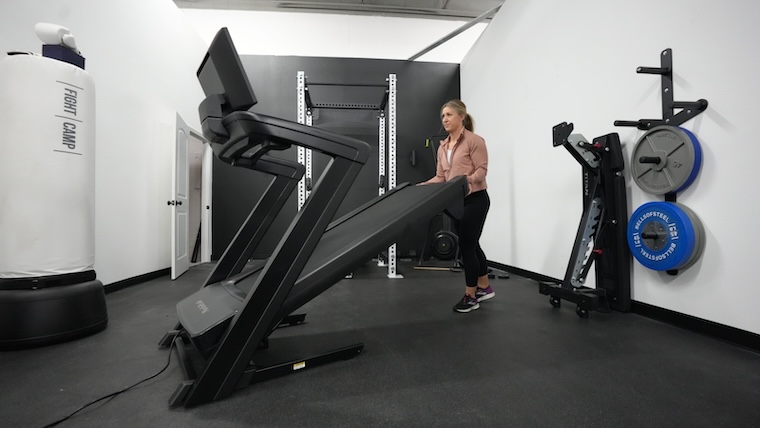
According to our measurements, the NordicTrack Commercial 1750 features a footprint of 11.36 square feet with its treadmill belt folded in the upright position, while the Sole F80 treadmill comes in at 11.61. Again, if you’re in need of a smaller silhouette, the Commercial 1750 is the best of the two.
The only measurement where the F80 is less than the Commercial 1750 — and why we rated the footprint and portability at 3.75 (Sole) to 3.5 (NordicTrack) — is in overall product weight. The Sole F80 weighs 274 pounds compared to NordicTrack’s 311.5-pound frame, which can make it easier to maneuver when it comes time to move your treadmill.
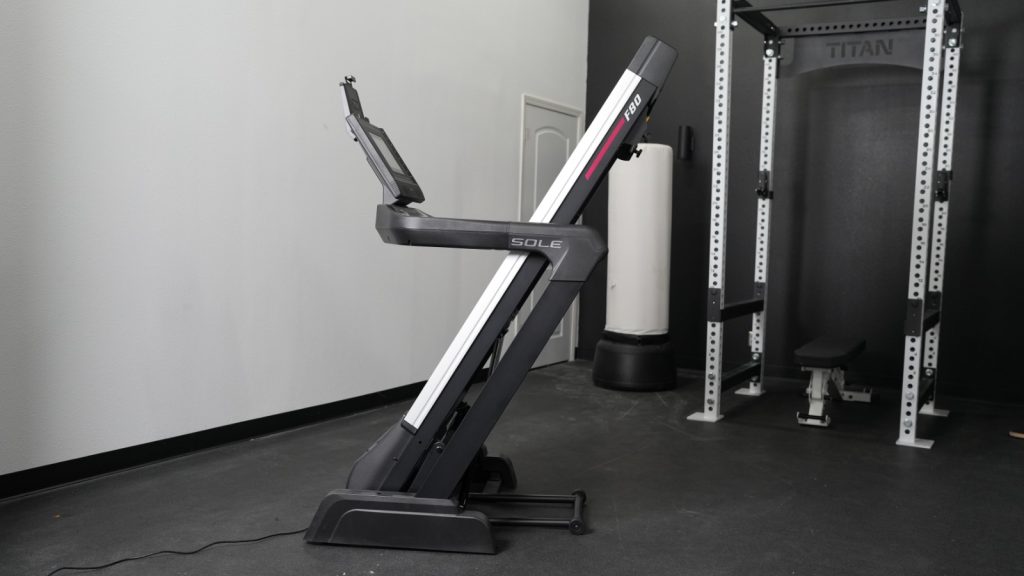
We also measured the “felt weight” of these treadmills, i.e., how heavy they can feel during trying to move the machines into position. The Sole F80 featured a felt weight of 77 pounds, while the NordicTrack Commercial 1750 measured in at 71.3 pounds. Still, though, we feel the spatial dimensions are more important here, so we’ll give the categorical victory to the Commercial 1750.
The Winner: NordicTrack Commercial 1750
Available Programming
If you’re looking for immersive training programs, both the Sole F80 and NordicTrack Commercial 1750 can deliver. Both silhouettes are compatible with training apps viewable across their full-color touchscreen displays — upgrades consoles over typical LCD screens — and the Wi-Fi connectivity helps ensure your service isn’t lost mid-workout (provided you have a strong internet connection).
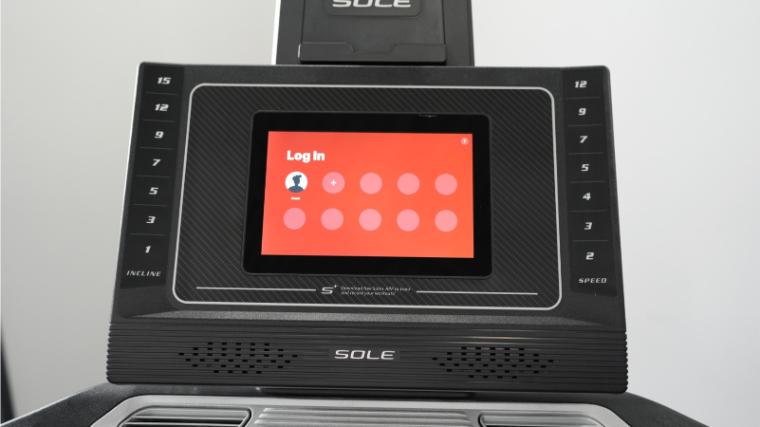
However, in terms of the programming itself, we have to give the nod to iFIT over Sole+. While the F80 does come with 10 preset programs as well as a tablet holder for viewing any of the best workout apps on the market, the NordicTrack’s iFIT compatibility is too much to ignore. “I really love the energy each iFIT coach brings to the workout,” says our tester, a certified personal trainer. “Plus, the SmartAdjust technology allows me to really focus on my strides rather than matching my speed and incline to the on-screen commands.”
Another area where iFIT shines is in its real-world routes powered by Google Maps. You can run, jog, and walk through some of the world’s most scenic environments, and the SmartAdjust feature can match the terrain to mimic, say, the tough climb of a western mountain or the rolling streets of an urban jaunt. Additionally, as of September 10, 2025, the updated iFIT 2.0 operating system now supports entertainment streaming services like Netflix, so you can zone out with your favorite series and movies while hitting your daily step count. (2)
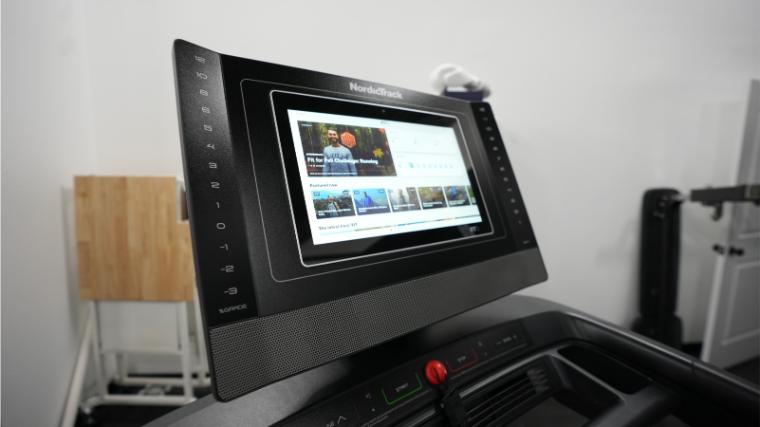
We scored the Sole F80’s available programming at 4 out of 5, and the Commercial 1750’s at 5 out of 5. While either can be suitable for engaging, efficient training, we feel there’s more on the bone when it comes to iFIT — which we’ve previously ranked as one of our favorite running apps.
The Winner: NordicTrack Commercial 1750
Audio and Haptics
We also examined the Sole F80 and NordicTrack Commercial 1750 for audio output, or how loud these best cardio machines were in operation. In general, this can be linked to the motor size, in which case the Commercial 1750 comes in with a larger 4.25 CHP motor as opposed to the F80’s 3.5 HP motor. CHP refers to continuous horsepower, or how much power the motor can continuously churn out without failure. HP refers to standard horsepower and often indicates the peak output.
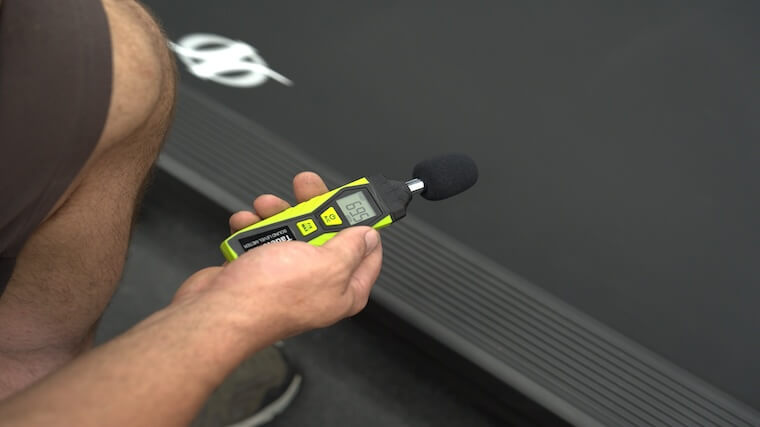
Our tester, a certified personal trainer, used a decibel reader to measure the audio levels of each treadmill. According to our trials, the Sole F80 featured a decibel reading of 67.3 decibels when standing 3 feet from the machine. The Commercial 1750 produced louder readouts at 69.4 decibels from the same difference. For reference, a running vacuum measures roughly 70 decibels. (3)
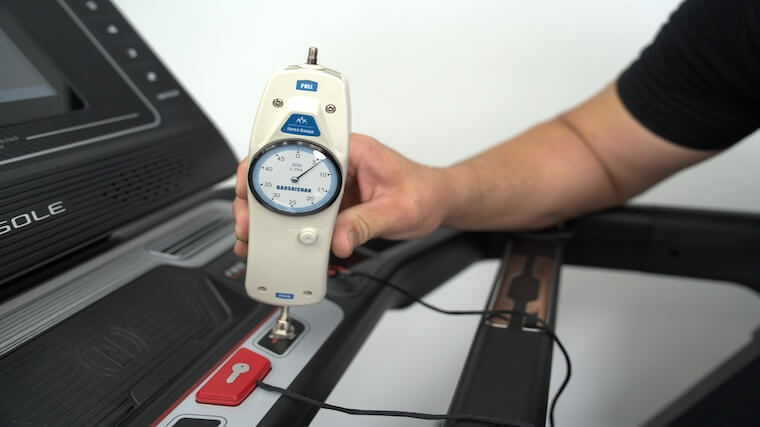
We also measured the force required to operate the buttons featured across the center console. This responsiveness test was conducted with a force meter to determine how much pressure (measured in pounds) was needed to acknowledge adjustments to speed and incline or simply start and stop a workout. Both treadmills came in at roughly 5 pounds of force, meaning the buttons aren’t light to the touch but aren’t abnormally difficult to engage.
Given the similar haptic readings and lower decibels of the F80, we feel that Sole Fitness takes this round over the Commercial 1750. You’ll still notice either machine in operation, but the lower volume could be a selling point for some, especially those looking to train around other home-dwellers taking calls or working from home.
The Winner: Sole F80
Workout Experience
In addition to the available programming, our testers were also pleased with the overall workout experiences with each treadmill. The handrails provided a nice sense of security, and there were no shakes or jostles at different speeds and inclines across either machine. Plus, the NordicTrack Commercial 1750 and Sole F80 feature Bluetooth compatibility, allowing our testers to pair their favorite heart rate monitors and running headphones to the consoles for better data tracking and audio.
We do give the win here to the Commercial 1750, though, given the display’s ability to tilt and pivot for off-treadmill workouts. While both the F80 and Commercial 1750 can be excellent for various treadmill workouts, only the NordicTrack profile features a rotating screen that can create a better viewing angle for other sessions.
After all, iFIT’s library of over 17,000 on-demand workouts includes modules for HIIT, yoga, strength training, and more, so having the ability to take part in these circuits without straining your neck or rearranging your space is a definite perk. If you were to try and stream off-treadmill workouts on the Sole F80, you’d need to have ample space at the rear of your machine to keep the instructors in full view.
The Winner: NordicTrack Commercial 1750
Warranty Coverage
If you look at how much treadmills cost, it can be imperative to look for machines with robust warranty plans. Case in point, the NordicTrack Commercial 1750 and Sole F80 cost $2,499 and $1,899.99, respectively. Thankfully, each brand does include service packages that can help you when things go awry.

According to NordicTrack, the Commercial 1750 comes with 10-year frame coverage as well as 2-year parts and 1-year labor support. You can upgrade to a 3-year extended warranty package ($329.99) for an additional 3 years for both parts and labor. A 3-year maintenance plan is also available for an additional $339.99, which can extend both parts and labor coverage to 3 years and includes an annual 15-point maintenance check, upon your request.
The Sole F80 is supported with a robust warranty from the start thanks to lifetime coverage for the frame and motor, 3-year support for the running deck, parts, and wear items, as well as 1-year coverage for labor and 90-day support for cosmetic items. Sole Fitness doesn’t offer extended warranties, but we do appreciate that there’s ample coverage from the get-go with this machine.
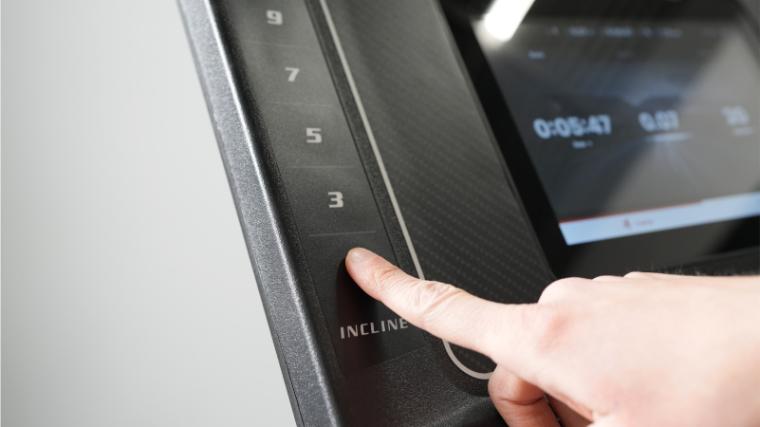
We rate the Sole F80 at 5 out of 5 for its warranty package and give it the categorical win. Of course, though, the best warranty package is one you never have to use — understanding how to fix common treadmill problems can go a long way in ensuring your machine stays in tip-top shape for plenty of sessions to come.
The Winner: Sole F80
FAQs: NordicTrack Commercial 1750 Vs. Sole F80
Does the NordicTrack Commercial 1750 work without iFIT?
The Commercial 1750 does offer a manual mode for non-iFIT workouts. That said, you will need an iFIT subscription to take advantage of all the features available including SmartAdjust technology, on-demand programming, and more.
Can you watch Netflix on the NordicTrack Commercial 1750?
As of September 10, 2025, the iFIT 2.0 operating system now supports popular streaming services such as Netflix. (2)
Is the Sole F80 treadmill good?
Classifying a treadmill as “good” can be subjective. However, we’re fans of this cardio machine thanks to its impressive cushioning, 15% max incline, and foldable running deck.
Does the Sole F80 have decline settings?
No, the Sole F80 does not feature decline capabilities across its 0-15% incline range.
References
- Jaramillo, C. (2022, December 29). A guide to sofa dimensions & sizes. SeatUp, LLC. https://seatup.com/blog/guide-to-sofa-dimensions/
- Ifit OS update – release notes: Ifit blog: Fitness. iFIT Blog. (2024, September 11). https://www.ifit.com/blog/fy25-os-update-release-notes/
- Sygrove, C. (2024, May 7). Decibel chart: All you need to know. MDHearing. https://www.mdhearingaid.com/blog/decibel-chart/